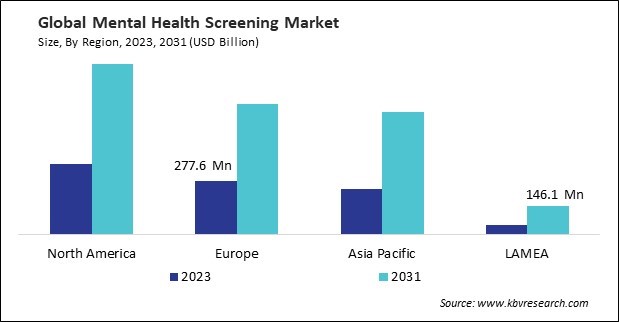According to a new report, published by KBV research, The Global Mental Health Screening Market size is expected to reach $2.4 billion by 2031, rising at a market growth of 12.5% CAGR during the forecast period.
The Children & Adolescents (age 0-18 years) segment is registering a CAGR of 13.2% during (2024 - 2031). Mental health disorders such as anxiety, depression, and ADHD are increasingly common among children and adolescents. According to the World Health Organization (WHO), mental health conditions account for 16% of the global burden of disease and injury in people aged 10-19 years.
The Clinical Settings segment is leading the Global Mental Health Screening Market by Setting in 2023; thereby, achieving a market value of $1.3 billion by 2031. Screening tools help clinicians identify mental health issues early, even before symptoms become severe, allowing for timely intervention and treatment. Many screening tools can be integrated into EHRs, allowing clinicians to easily track and monitor patients' mental health over time.

The Telehealth and virtual care solutions segment shows a CAGR of 11.7% during (2024 - 2031). Telehealth and virtual care solutions allow individuals to access mental health services from the comfort of their homes, eliminating the need for travel and reducing barriers to care. Advances in technology, such as secure video conferencing platforms and digital health apps, have made telehealth and virtual care solutions more user-friendly and effective.
The Self-reported Questionnaires & Surveys segment dominated the Global Mental Health Screening Market by Screening Method in 2023; thereby, achieving a market value of $867.9 million by 2031. Self-reported questionnaires and surveys can be easily administered online or in person, making them accessible to many individuals. This convenience encourages more people to participate in mental health screening, leading to earlier detection of mental health issues. Many self-reported questionnaires and surveys used for mental health screening are standardized and validated for reliability and validity.
The Physiological Disorders segment is leading the Global Mental Health Screening Market by Application in 2023; thereby, achieving a market value of $915 million by 2031, growing at a CAGR of 11.8 % during the forecast period. Physiological disorders refer to conditions that affect the normal functioning of the body's systems and organs. These disorders can arise from genetic factors, environmental influences, lifestyle choices, or a combination. Physiological disorders can significantly impact an individual's health and quality of life.
The Dissociative Disorder market is expected to witness a CAGR of 13.4% during (2024 - 2031). . Dissociative disorders are often associated with a history of trauma, particularly during childhood. Traumatic experiences, such as abuse, neglect, or other forms of interpersonal violence, can lead to the development of dissociative symptoms as a coping mechanism. Early detection and intervention for dissociative disorders can lead to better outcomes, motivating healthcare providers to screen more individuals.
The Depression & Anxiety segment dominated the Global Mental Health Screening Market by Physiological Disorders Type in 2023; thereby, achieving a market value of $331.4 million by 2031. Modern lifestyles, characterized by high levels of stress due to work, financial pressures, and societal expectations, contribute to the development of depression and anxiety. Environmental factors such as pollution, noise, and other stressors can also impact mental health and contribute to the development of depression and anxiety.
The Dementia segment dominated the Global Mental Health Screening Market by Cognitive Disorders Type in 2023; thereby, achieving a market value of $143 million by 2031. As people live longer, the number of individuals at risk for developing dementia increases. Advancing age is the greatest known risk factor for dementia, with the risk doubling every five years after the age of 65. Lifestyle factors also contribute to the prevalence of dementia. Conditions such as diabetes, hypertension, and obesity, which are often associated with unhealthy lifestyle choices, can increase the risk of developing dementia.
The Aggression segment is anticipating a CAGR of 12% during (2024 - 2031). The rising use of mental health screening tools in aggression behavioral disorders reflects a growing recognition of the importance of early identification and intervention in individuals at risk. The Modified Overt Aggression Scale (MOAS) or the Buss-Perry Aggression Questionnaire (BPAQ) screening tools can help identify individuals who may be prone to aggressive behavior and assess the severity of their symptoms.
Full Report: https://www.kbvresearch.com/mental-health-screening-market/
The North America region dominated the Global Mental Health Screening Market by Region in 2023, and would continue to be a dominant market till 2031; thereby, achieving a market value of $887.2 million by 2031. The Europe region is experiencing a CAGR of 12.1% during (2024 - 2031). Additionally, The Asia Pacific region would exhibit a CAGR of 13.3% during (2024 - 2031).
By Age Group
By Setting
By Technology
By Screening Method
By Application
By Geography
 Unique Offerings
Unique Offerings